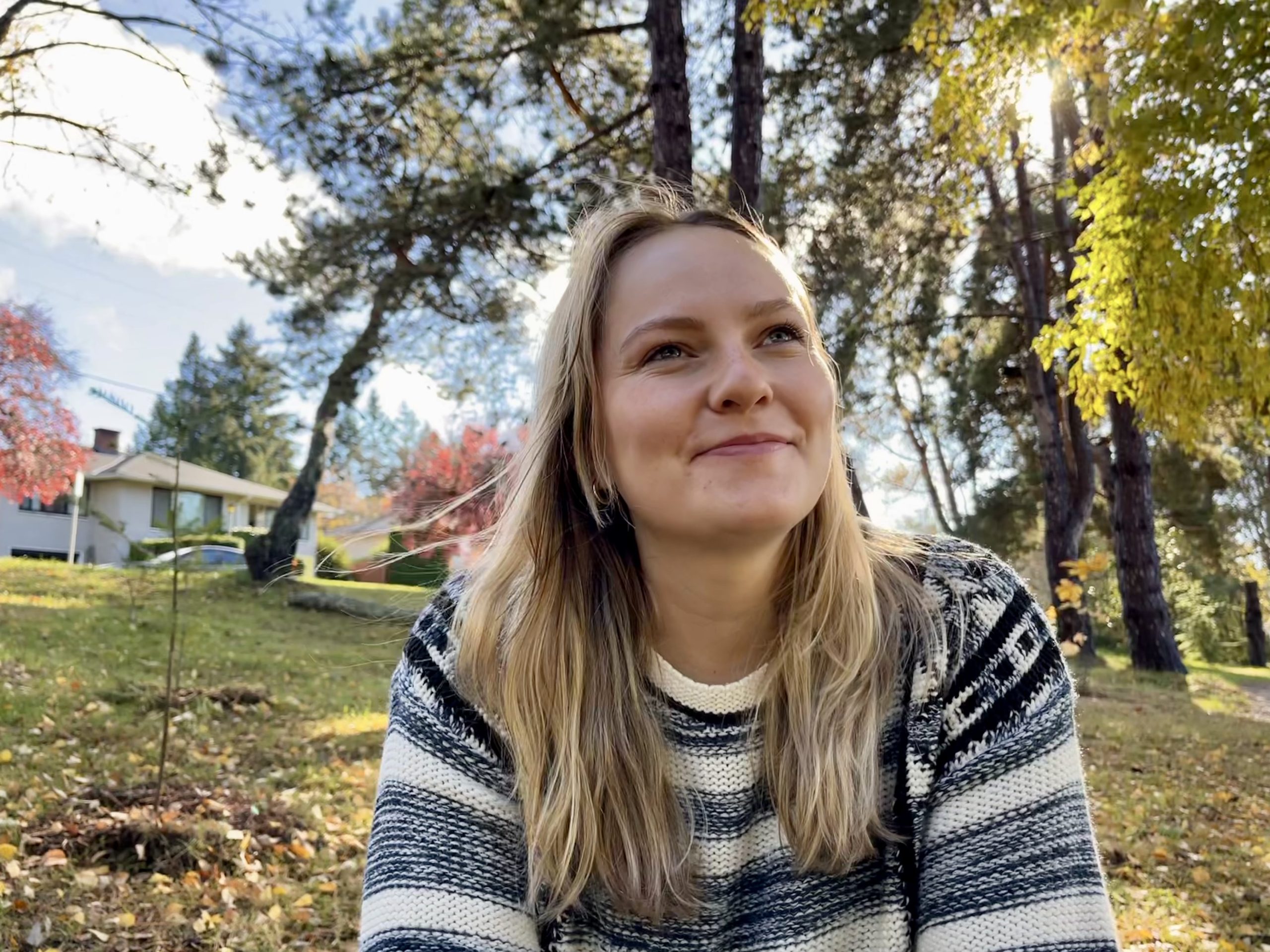A Climate Disaster Project feature series
The stories in this series were shared as part of the Climate Disaster Project (CDP), an international collaboration of post-secondary and media partners coordinated through UVic’s writing department. Students in CDP classes learn trauma-informed techniques for interviewing and working with survivors of disasters from wildfires to floods to extreme heat. Before they take that work into the community, these students interview each other, sharing their own experiences with climate change and what they think they can be done about it. These are some of their stories.

Linnea Burke, photo by Georgia Myles.
Victoria, Canada, Osoyoos-Oliver Wildfire, 2021
Linnea is a student at the University of Victoria. Growing up in the community of Squamish, she was drawn to UVic as it is only a ferry ride away, just across the Strait of Georgia. The coastal environment inspired her to study marine biology, but Linnea found she was more interested in the political and social aspects of the environment, moving on to complete a degree in environmental studies and political science. While completing her studies, she lives with six girls and two dogs.
This was 2021, the year after COVID. Things were starting to open up again and I planned a trip with my friend Amelia from high school to stay at her family’s property near the lake in Osoyoos. Her family has this really cute little cabin her grandpa built that’s basically one room and they have an RV that we were sleeping in. I had planned the trip a while in advance. It’s becoming something where, whenever you make any summer plans in BC, you’re just hopeful the wildfires aren’t too bad because you never know.
We went about the trip as normal, which is weird to say. What really sticks out for me is this one night, we went on a walk up to this point that goes out into the middle of Osoyoos Lake with the dogs. It was dark. Looking across the lake, we could see little red dots of fire on the hillside and you could even see the flames moving. It was quite hazy, the wind had shifted, but you could definitely still tell that the fire was there.
My friend and her parents told me that, even a few days before it was way worse, they could see big chunks of fire at night burning along the hill. They weren’t in imminent danger because it was on the other side of a pretty big lake. I’ve never seen even small fires like that up close, I had only experienced seeing the smoke from them. It was really jarring.
When there’s a lot of smoke in the air, it feels weirdly silent. It muffles everything, so I remember it being kind of apocalyptic. One night we went to this little amusement park and they have a mini golf course and cotton candy. But you could still smell the wildfire smoke all the time. It was always in the background.
I stayed for three or four days and then I drove back with my dog alone. The smoke got so bad in this one section of the Crowsnest Highway that I could barely see the road 200, 300 meters ahead of me. I knew vehicles coming the other way also probably couldn’t see very far ahead of them. I had my headlights on in the middle of the day, driving through really heavy smoke. I was checking the wildfire map and all the alerts for highway closures. Roads pretty close by were getting closed off because there was a fire fairly close up the mountain. It felt weird to come back to Squamish and have significantly less smoke and less presence of wildfire.
It always feels very strange to go on living normal life when I know there’s also people who are being acutely impacted by the fires. A lot of the time it feels like there’s not anything to be done about it, even though I know that’s not the case. I’m an environmental studies student. I work with lots of people who are really passionate about slowing down climate change, and about taking practical action towards it. I’m lucky to live somewhere where it hasn’t so far been as big of an issue, but I think it just made me scared for the future, honestly. Whenever there’s a threat of wildfires I’m more aware of it than maybe other friends and family. Every summer is a reminder that nature is really powerful and it doesn’t care if there’s a town there.
I didn’t directly experience a loss of my home or safety, so I feel like I’m someone who can offer support to those who are more affected. We all need to support each other and be aware that there’s people who struggle with asthma, or who aren’t as mobile. It seems like every wildfire season, there’s no strong leadership: not to make people feel better, that’s not necessarily what needs to happen, but to prepare people better. To keep having conversations about being prepared, and what you would do in case of having to evacuate, or letting people you know that live in other areas of the province they can stay with you. Having those conversations with people preemptively is important.
We all have individual responsibility, but we need to collectively push bigger corporations and governments to take action and to transition away from fossil fuels. We need to have a balance of people and human needs, and that needs to be led by First Nations groups and voices. You can’t deny it anymore because we experience it every season. It’s really scary, but we have to face it.







